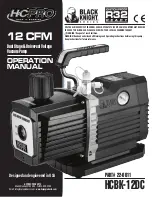
10
The Discharge Pipe:
• Shall not be smaller in size than the outlet pipe size of the valve, or
have any reducing couplings or other restrictions.
• Shall not be plugged or blocked.
• Shall be of material listed for hot water distribution.
• Shall be installed so as to allow complete drainage of both the
temperature-pressure relief valve, and the discharge pipe.
• Shall terminate at an adequate drain.
• Shall not have any valve between the relief valve and tank.
The temperature-pressure relief valve must be manually operated at
least once a year. Caution should be taken to ensure that (1) no one is
in front of or around the outlet of the temperature-pressure relief valve
discharge line, and (2) the water manually discharged will not cause
any bodily injury or property damage because the water may be
extremely hot.
FIGURE 4.
If after manually operating the valve, it fails to completely reset and
continues to release water, immediately close the cold water inlet to
the water heater, follow the draining instructions, and replace the
temperature-pressure relief valve with a new one.
FILLING THE WATER HEATER
Never use this water heater unless it is completely full of water. To
prevent damage to the tank, the tank must be filled with water. Water
must flow from the hot water faucet before turning “ON” electrical
supply to the water heater.
To fill the water heater with water:
1. Close the water heater drain valve by turning the handle to the right
(clockwise). The drain valve is on the lower front of the water
heater.
2. Open the cold water supply valve to the water heater.
NOTE: The cold water supply valve must be left open when
the water heater is in use.
3. To insure complete filling of the tank, allow air to exit by opening the
nearest hot water faucet. Allow water to run until a constant flow
is obtained. This will let air out of the water heater and the piping.
4. Check all water piping and connections for leaks. Repair as needed.
T&P VALVE and PIPE INSULATION
(On Selected Models)
Remove insulation for T&P Valve and pipe connections from carton.
Fit pipe insulation over the incoming cold water line and the hot water
line. Make sure that the insulation is against the top cover of the heater.
Fit T&P Valve insulation over valve. Make sure that the insulation does
not interfere with the lever or outlet of the T&P valve.
Secure all insulation using tape.
FIGURE 5.
PIPE INSULATION
Summary of Contents for 184671-000
Page 3: ...3 GENERAL SAFETY ...
Page 27: ...27 ...











































